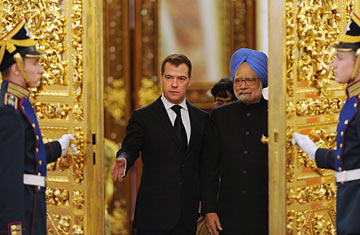
Russian President Dmitri Medvedev and Indian Prime Minister Manmoham Singh enter a hall during their meeting at the Kremlin
Indian Prime Minister Manmohan Singh visited Moscow this week to negotiate a multibillion-dollar arms deal, meet the Russian President and Prime Minister and seal a new civilian nuclear deal with Russia — which the Indian press hailed as even more advantageous than India's similar technology-sharing agreement with the U.S. Singh told a Russian news channel, "We have been able to get equipment and technologies from Russia which were not available to us from any other countries."
So what happened to that new era of Indo-U.S. friendship, celebrated so elaborately and so recently over gilded plates of collard greens and basmati rice? It certainly hasn't been forgotten, but the ritual pomp and genuine goodwill of the Nov. 24 state visit to Washington have quickly made room for the realities of Indian politics. The Russian bear hug is a "note of caution" and a reminder of earlier American agreements gone sour, says G. Parthasarathy, a former Indian ambassador and visiting professor at the Centre for Policy Research in New Delhi. While the details of the U.S. deal are still being ironed out and President Obama has stressed his commitment to completing it, Russia has a much longer history of supporting India's nuclear ambitions. "Russians have a track record of reliability," says Parthasarathy. "With the U.S., we'll have to wait and see. That memory within the Indian establishment runs very deep."
The Indian foreign policy establishment may welcome the new and much more prominent role that India is playing in Washington, but it will always look for assurances that it hasn't sacrificed its strategic independence. India's top foreign-service officers and politicians are still steeped in Jawaharlal Nehru's vision of a nonaligned India, a belief that cuts across party lines. So every step closer to the U.S.'s embrace is likely to be followed with at least a symbolic show of keeping its distance. Witness Singh's ceremonial review of a fur-hatted Russian honor guard less than two weeks after dining at the Obamas'.
Even where the U.S. and India agree, India has been careful not to appear to be too close. India joined the U.S. and 24 other countries in voting to censure Iran's nuclear program at a meeting of the International Atomic Energy Agency (IAEA) in Vienna on Nov. 27. This was the third time India had voted for a similar resolution, and India didn't want to jeopardize its own safeguards agreement with the IAEA, but the Indian Foreign Ministry issued a statement clarifying that its vote shouldn't be read as support for new sanctions: "India firmly supports keeping the door open for dialogue and avoidance of confrontation." This isn't just diplomatic bet-hedging; it's a mirror of India's sharpening picture of itself as a superpower, one that will interact with other countries on its own terms.
The true test of India's new strategic importance is still to come. The Indian Defense Ministry has announced a massive modernization program estimated to cost as much as $100 billion over the next decade. Russia has long been India's biggest defense supplier, but the civilian nuclear deals and safeguards agreement that India has signed with several countries opens the doors for U.S. and European companies to win some of that massive spending.
The most closely watched deal will be the Indian Air Force's planned purchase of 126 multirole combat aircraft, a contract worth about $10 billion. The IAF has recently begun its field tests of the six finalists, who represent India's old and new allies. In the running are Russia's MiG35, Boeing's FA-18, Lockheed's F-16 and fighter jets from EADS, Dassault and Saab. This is the biggest single tender ever floated by the Indian military, and the decision will be influenced as much by geopolitics as by technical superiority. "Strategic weapons are not only about technology," says Deba Ranjan Mohanty, a defense expert at the Observer Research Foundation in New Delhi. "It's also about building relationships with the country." Those in the running will have about two years to demonstrate how willing they are to share technology and how closely their national interests are aligned. A state dinner is just a start.
